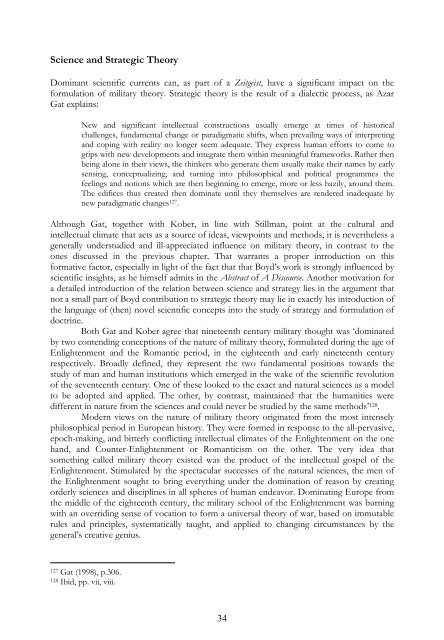Science, Strategy and War The Strategic Theory of ... - Boekje Pienter
Science, Strategy and War The Strategic Theory of ... - Boekje Pienter
Science, Strategy and War The Strategic Theory of ... - Boekje Pienter
You also want an ePaper? Increase the reach of your titles
YUMPU automatically turns print PDFs into web optimized ePapers that Google loves.
<strong>Science</strong> <strong>and</strong> <strong>Strategic</strong> <strong>The</strong>oryDominant scientific currents can, as part <strong>of</strong> a Zeitgeist, have a significant impact on theformulation <strong>of</strong> military theory. <strong>Strategic</strong> theory is the result <strong>of</strong> a dialectic process, as AzarGat explains:New <strong>and</strong> significant intellectual constructions usually emerge at times <strong>of</strong> historicalchallenges, fundamental change or paradigmatic shifts, when prevailing ways <strong>of</strong> interpreting<strong>and</strong> coping with reality no longer seem adequate. <strong>The</strong>y express human efforts to come togrips with new developments <strong>and</strong> integrate them within meaningful frameworks. Rather thenbeing alone in their views, the thinkers who generate them usually make their names by earlysensing, conceptualizing, <strong>and</strong> turning into philosophical <strong>and</strong> political programmes thefeelings <strong>and</strong> notions which are then beginning to emerge, more or less hazily, around them.<strong>The</strong> edifices thus created then dominate until they themselves are rendered inadequate bynew paradigmatic changes 127 .Although Gat, together with Kober, in line with Stillman, point at the cultural <strong>and</strong>intellectual climate that acts as a source <strong>of</strong> ideas, viewpoints <strong>and</strong> methods, it is nevertheless agenerally understudied <strong>and</strong> ill-appreciated influence on military theory, in contrast to theones discussed in the previous chapter. That warrants a proper introduction on thisformative factor, especially in light <strong>of</strong> the fact that that Boyd’s work is strongly influenced byscientific insights, as he himself admits in the Abstract <strong>of</strong> A Discourse. Another motivation fora detailed introduction <strong>of</strong> the relation between science <strong>and</strong> strategy lies in the argument thatnot a small part <strong>of</strong> Boyd contribution to strategic theory may lie in exactly his introduction <strong>of</strong>the language <strong>of</strong> (then) novel scientific concepts into the study <strong>of</strong> strategy <strong>and</strong> formulation <strong>of</strong>doctrine.Both Gat <strong>and</strong> Kober agree that nineteenth century military thought was ‘dominatedby two contending conceptions <strong>of</strong> the nature <strong>of</strong> military theory, formulated during the age <strong>of</strong>Enlightenment <strong>and</strong> the Romantic period, in the eighteenth <strong>and</strong> early nineteenth centuryrespectively. Broadly defined, they represent the two fundamental positions towards thestudy <strong>of</strong> man <strong>and</strong> human institutions which emerged in the wake <strong>of</strong> the scientific revolution<strong>of</strong> the seventeenth century. One <strong>of</strong> these looked to the exact <strong>and</strong> natural sciences as a modelto be adopted <strong>and</strong> applied. <strong>The</strong> other, by contrast, maintained that the humanities weredifferent in nature from the sciences <strong>and</strong> could never be studied by the same methods’ 128 .Modern views on the nature <strong>of</strong> military theory originated from the most intenselyphilosophical period in European history. <strong>The</strong>y were formed in response to the all-pervasive,epoch-making, <strong>and</strong> bitterly conflicting intellectual climates <strong>of</strong> the Enlightenment on the oneh<strong>and</strong>, <strong>and</strong> Counter-Enlightenment or Romanticism on the other. <strong>The</strong> very idea thatsomething called military theory existed was the product <strong>of</strong> the intellectual gospel <strong>of</strong> theEnlightenment. Stimulated by the spectacular successes <strong>of</strong> the natural sciences, the men <strong>of</strong>the Enlightenment sought to bring everything under the domination <strong>of</strong> reason by creatingorderly sciences <strong>and</strong> disciplines in all spheres <strong>of</strong> human endeavor. Dominating Europe fromthe middle <strong>of</strong> the eighteenth century, the military school <strong>of</strong> the Enlightenment was burningwith an overriding sense <strong>of</strong> vocation to form a universal theory <strong>of</strong> war, based on immutablerules <strong>and</strong> principles, systematically taught, <strong>and</strong> applied to changing circumstances by thegeneral’s creative genius.127 Gat (1998), p.306.128 Ibid, pp. vii, viii.34
















